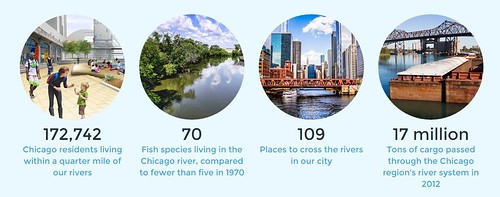Great Rivers Chicago: Regional, Public Open-House Meetings

Anyone visiting Downtown Chicago has likely walked along the Chicago River at some point, so it should be no surprise that in addition to miles of lakefront along Lake Michigan--Chicago is unique among major cities in that most of its lakefront has been preserved for public access, the city has 100+ miles of rivers, including the Calumet and Des Plaines Rivers in addition to the Chicago River.
The Great Rivers Chicago initiative is a planning process aimed at creating better connections with the city's rivers, which are still actively used for commerce as well as recognition, and in some places, ignored.
This follows more recent initiatives by the City of Chicago focused on the Chicago River exclusively ("Rahm Emanuel: City to build boathouses on Chicago River," Chicago Sun-Times; Chicago Riverwalk extension no cakewalk," Chicago Tribune; "What the Chicago Riverwalk Will Look Like, and What That Means," Chicago Magazine). The first two blocks of the extension of the Chicago Riverwalk opened in May ("Curtain rises Saturday on $100 million Riverwalk extension," Chicago Tribune).
From the website:
From spring 2015 to summer 2016, the City of Chicago and Metropolitan Planning Council, in partnership with Friends of the Chicago River and many others, is embarking on a process to reimagine our city's Calumet, Chicago and Des Plaines rivers and riverfronts. From improved shipping to water quality to dining options, we're scouring existing plans and reaching out to business owners, community leaders and people just like you to create a coordinated vision for our rivers' future.There is an upcoming set of community meetings for the program.
Based on conversations we’ve had and research to date, we offer six draft principles for what our rivers should provide by 2040:
VIBRANCY
vibrant, diverse destinations and corridors that showcase development and conservation throughout all corners of the city
BALANCE
efficient, safe, balanced and managed movement of goods, people and wildlife
COMPATIBILITY
compatible, mutually supporting industrial, natural, residential, commercial and recreational uses that are transparently and cohesively coordinated and are well managed by all relevant parties
ACCESSIBILITY
integral, active and engaging part of a broader interconnected regional landscape of parks, preserves, trails, lakes communities and jobs
HEALTH
improved quality of life and resiliency of people, wildlife and businesses through high-quality water management, habitat restoration and the provision of active lifestyle opportunities
RENOWN
signature element of Chicago’s global brand
-- Register for Meetings
Thursday, Oct. 1 (Far North Side)
Horner Park Field House
2741 W. Montrose Ave.
Chicago
Thursday, Oct. 8 (Far South Side)
Rowan Park Field House
11546 S. Avenue L.
Chicago
Wednesday, Oct. 28 (Near South Side)
Ping Tom Park Field House
1700 S. Wentworth Ave.
Chicago
Wednesday, Nov. 4 (Near North Side)
REI Community Room
1466 N. Halsted St.
Chicago
Labels: parks planning, rivers and waterfronts, shipping/transportation



1 Comments:
Nice article.
visit here-common ed drugs from Online medicine store.
Post a Comment
<< Home